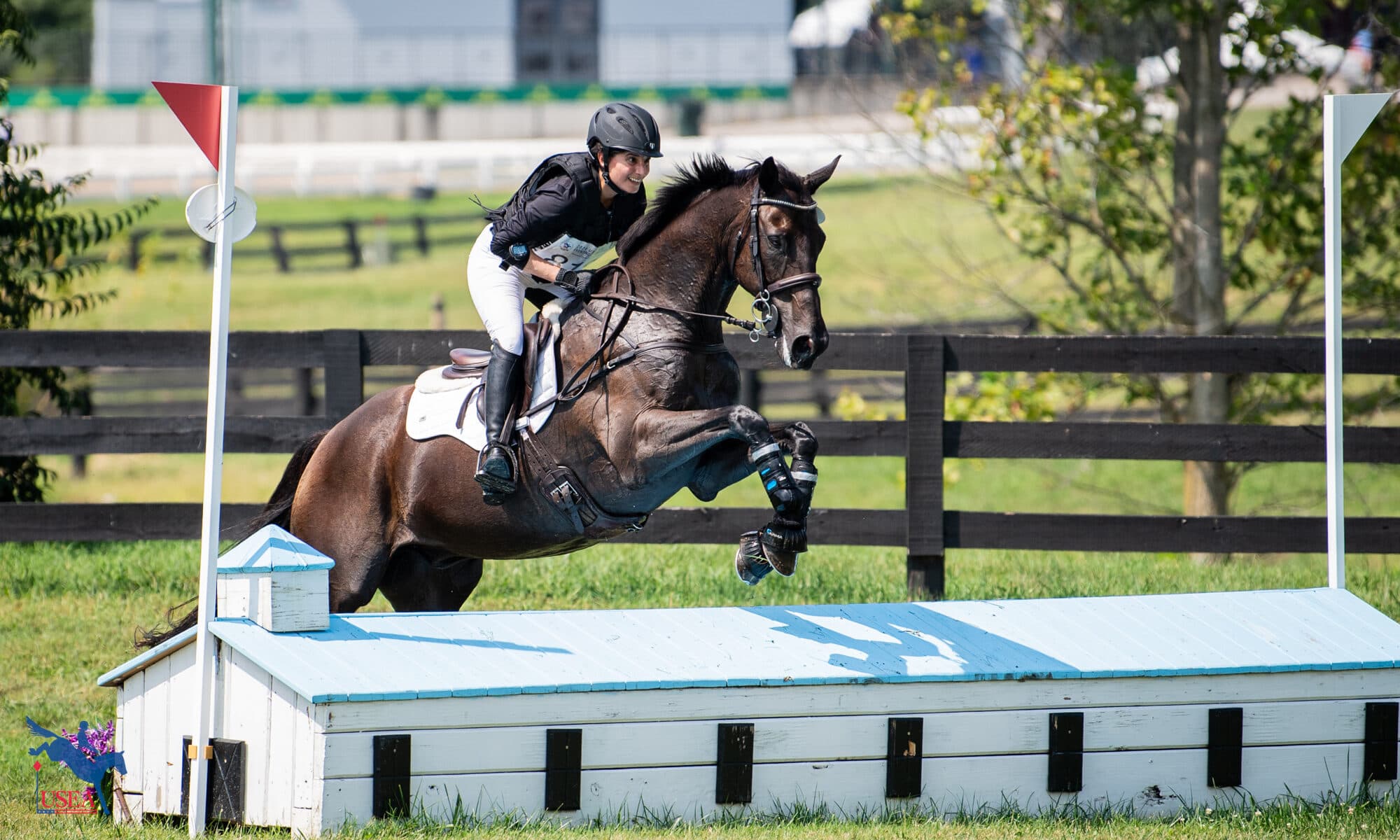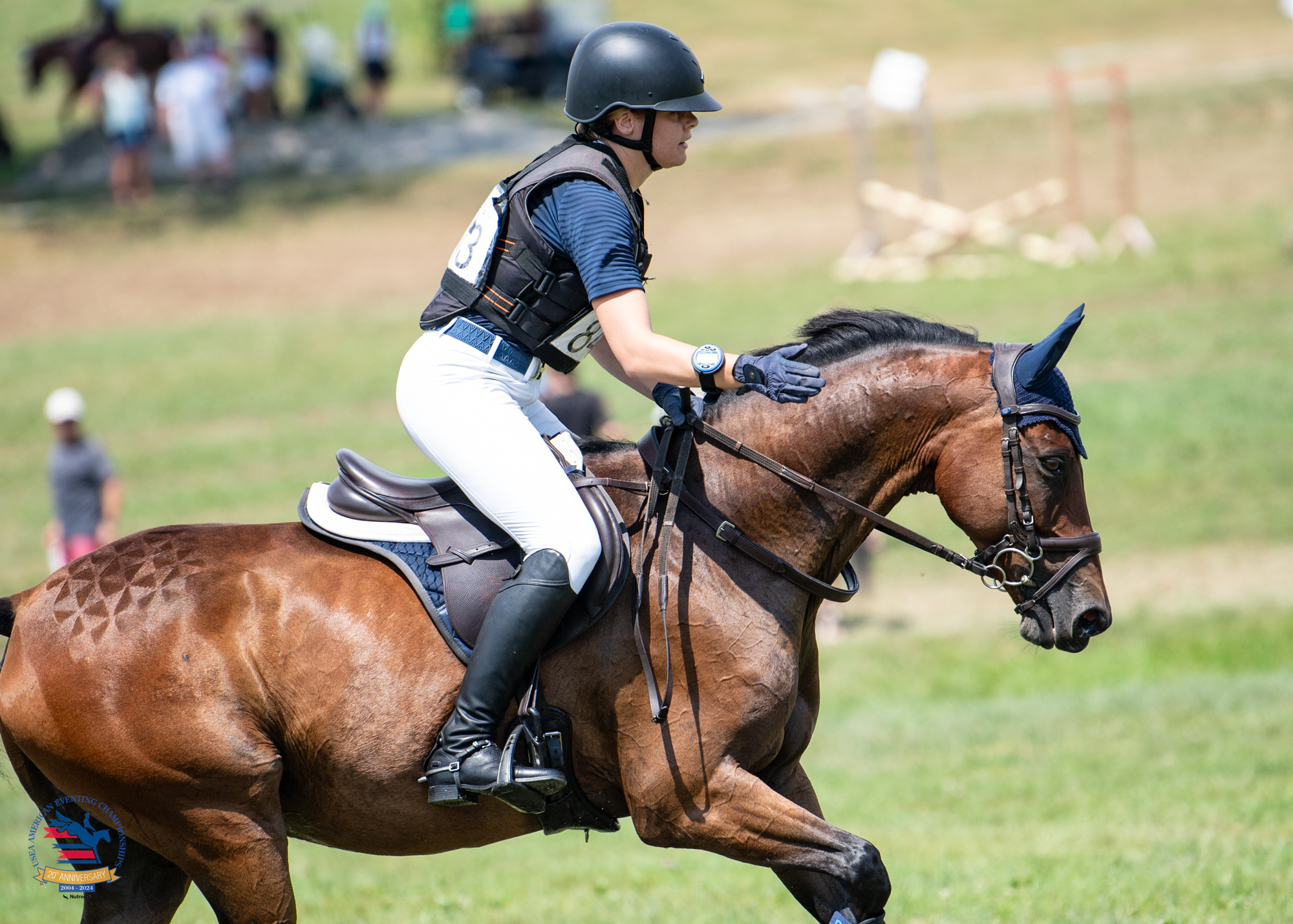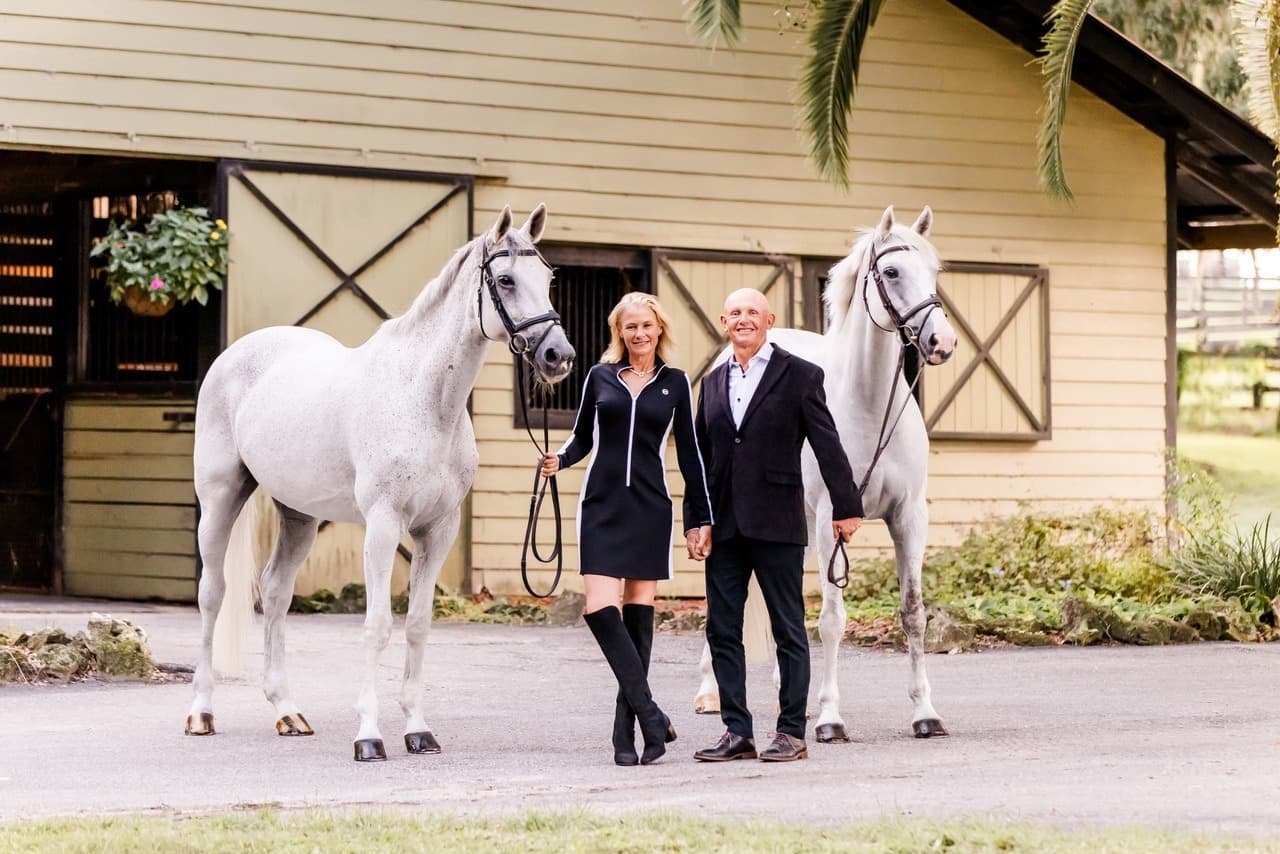My Stable, My Sanctuary: Crisis Workers Ali Martinez and Kylie Stangle Find Peace at the Barn

Walking through a set of faded wooden barn doors is like meandering into a hushed library. Instead of twisting aisles filled with story after story, barn aisles are filled with the sounds of munching hay, soft breathy snorts, and stomping hooves. It’s a place that can seem to be out of reach to much of the outside world. A barn is a dusty, sunlit cocoon, tucked away from the chaos of work, school, and stress.
For Ali Martinez and Kylie Stangle, the sanctuary that they find at the barn is more crucial than it is to most. Martinez and Stangle are both crisis workers; Martinez runs the Alachua County Crisis Center in Gainesville, Florida, while Stangle is a mobile response crisis worker. These two women met only once, at the 2024 USEA American Eventing Championships presented by Nutrena Feeds, where Stangle won the Beginner Novice Amateur division with Janina Parmelee’s German Riding Pony cross Redfield Mikke (Maximus x Maritza), and Martinez took second with Amanda Tamminga’s Thoroughbred Codename Toby (Treasure Cove x Go Bubby Go).
There was a moment of recognition between the two during the press conference when they mentioned their respective careers. Glancing at each other, a silent acknowledgement of all the stress and trauma that goes along with their field seemed to pass between them.
Stangle has been a mobile response crisis worker in New Jersey for the last 2 ½ years. She intervenes during moments of crisis in someone’s life, whether that’s suicide attempts, self-harm, or homicide. Stangle is the first line of defense and sticks with the family or individual for the following eight weeks while they adjust to therapy and any other interventions that may be needed.
“We will go out to the family's homes and assess their needs and talk about what's going on,” Stangle said. “And then if they need to go to further screening, like if there's any suicide or self-harm or homicide, we will make those calls while we're at the home, just to make sure everyone's safe. It could be related to any type of mental health crisis: abuse, anger management, suicidal thoughts, self-harm. The youngest person I’ve had in my caseload was a 1-year-old, and the oldest was 20 years old, because my office only supports people up to age 21.”
While Stangle’s work is undeniably hard—she often deals with a very dark side of the human psyche—she finds it extremely rewarding. “One story really sticks with me–I went back to a house for another child, and I got to see their sibling, who I was there for around a year before, and he thanked me. He said, ‘I want to thank you so much for coming out and getting me a therapist, and I just feel so much better.’ That has stuck with me. He was 9 years old saying this, and I was trying not to cry at the time,” Stangle said.
According to Stangle, most of the families she works with are grateful for her intervention, as she’s really there just to listen and connect them with the right help. Unfortunately, Stangle’s work doesn’t always have a happy ending, and it can be tough for her to let go of certain cases.
“Sometimes you'll get a case, and you'll be like, ‘I should have done this, this or this,’ ” Stangle said. “But then you have to remind yourself that you did everything that you're supposed to do. I just remind myself, work your hours and make sure work stops when your hours are done for the day. Pick it back up tomorrow.”
Working in such a stressful career takes a real toll on Stangle, who has to prioritize mental and emotional self-care to prevent burnout. “You have to be very self-aware in this career, so you know what your triggers are and then identify them and do something about it, so you don't continue to bring [the stress] along with you.”
The barn has become an essential part of preventing burnout for Stangle, who says her time with “Mickey” keeps her grounded. “Being at the barn just helps clear my busy mind. I could just be there to ride, groom, help around the farm—whatever I'm doing, just being there, surrounded with horses, makes me feel calmer,” Stangle said. “Being around the ponies definitely reminds me to be present in the moment and take some deep breaths. Everything's gonna be fine.”
Stangle has a particularly special relationship with Mickey, despite the fact that he’s the smallest horse in the barn, and she’s the tallest rider in the barn. Because of his sensitive nature, he reminds her not to bring her work to the barn with her.
“He is a very emotional little dude. He picks up on energy really easily. And if you go to ride him and you're just a little bit more tense, or you're like, ‘I've had a bad day,’ he's like, ‘No.’ And then I have to just let it go and work on myself,” Stangle said. “So, it's about being self-aware. If you're having a bad day, try to put it away before you get on the horse or change it up. If riding in the ring is too stressful because I'm already stressed, then we'll just go on a hack or go jump around in the cross-country field. Horses are great that way. They'll tell you to cut it out.”

Stangle has made it a rule to incorporate some sort of physical activity into every day, preferably riding Mickey. “I wake up early in the morning, I go to the barn, I see Mick, hang out with him, and then I'm off. When I come back home, I feel ready to take on the workday because I hung out with my favorite dude. I did all the fun things. Even if it's just a walking ride—that is plenty enough. I can’t explain it. I feel calm, ready to tackle the day.”
Horses have been there for Stangle since she was a kid. “I was a very shy kid, and I didn't have many friends at school. My mom was worried, so she put me into horseback riding. And then after that I gained all the confidence in the world and my self-esteem improved. I learned to be more patient. When I became older, whenever I was super stressed, I would go to the barn, and then I would come back a completely different person.”
Like Stangle, Martinez has also been riding since she was young. “I started riding when I was 8, and my childhood was pretty chaotic. We had some pretty intense experiences as a family, including losing everything in Hurricane Andrew in Miami. I always had a pretty big heart. I always felt things very intensely. I found horses early, and it really gave me a place to channel my heart. It gave me a place to really connect deeply with something,” Martinez said.
Martinez is director of the Alachua County Crisis Center, which offers 24/7 crisis phone counseling, mobile response care teams, and suicide intervention services. “I have a PhD in counseling education, and I have been a therapist for well over 20 years,” she said. “At some point in my career, I found the crisis center and crisis and suicide intervention work and just absolutely fell in love with it. It really spoke to me and how I operate in the world. I've been doing crisis intervention work for almost 20 years.”
Martinez’s work can be, quite literally, life and death. “We go out into the community when there is somebody who is in crisis. Let's say that they've had a death in the family, an accident, house fire, or are in a high level of mental health distress and need support and assessment. We'll respond to people's homes, to traffic accidents, to doctors’ offices. We'll go anywhere when there's somebody in a high level of distress that needs in-person response and support,” Martinez said.
Despite the pressure, she also finds her job rewarding, to say the least. “I really fell in love with the mental health field early, but crisis work in particular really speaks to me very deeply,” Martinez said. “To be with people in the most difficult points of their lives, to hear their stories, to be able to be whatever comfort and support that we can be… You know, think about the loneliness that we can feel when we're at that level of crisis or distress or despair. It's really important that there are people who can respond and often just be there. I think those opportunities to be there with people in those moments are incredibly rewarding.”
As rewarding as her work is, Martinez has to make sure she doesn’t give too much of herself. “I really have to keep on top of my self-care. I have to be really good about knowing myself, knowing my body, knowing I need a break, knowing I need support. It's easy for me to pour out all of myself into the work, and I have to keep an eye on myself. Over the decades I’ve learned how to tell when to say, ‘OK, I need to step away. I need a break.’ I know how to really find my balance and ground myself again.”
A crucial part of regaining her balance is going to the barn. “I was drawn to that partnership that we build with our horses,” Martinez said. “When I get to escape into that, it taps into the same part of me as my work: my deep heart, deep feeling, but it's at the soul level, right? There's just that feeling of, ‘Gosh, I can use all of those same skills of empathy and heart, but with this amazing animal that is willing to partner with me.’ I think that horses meet the same sort of need that my work does in a weird way, but in a much deeper soul kind of way. It gets me away from other people's chaos and gets me into a space of peace and balance.”
Martinez treasures the time she spends at the barn with “Toby.” “You can imagine that running a crisis center, there's 1,000 things happening at once,” Martinez said. “At the barn, there's just one thing happening. It's just me and Toby and that singular focus. How am I going to approach this jump, or how am I going to get a really good bend on this corner? And so having a singular focus like that is such a beautiful escape for me from the intensity and the chaos of my work.”
Beyond the bounds of her career as a crisis worker, Martinez says that horses have been there for her in many different ways throughout all the periods of her life. “I've sort of gone through the normal journey of figuring out who I am in the world and what I want to do with my life, and how I connect with others, and in and out of relationships, and through all of that, riding has always been the constant,” Martinez said. “It's been the part of myself and my identity that I can always go back to. Knowing that I could rely on that throughout my life has been unequivocally important. As we go through life, and we're sorting out all these different paths and all these different aspects of ourselves and our past and our trauma and our joy, even in the midst of whatever chaos was happening, I knew riding would always be there.”
Martinez believes all equestrians take comfort in their connection with their horse, or even just in spending time at the barn. “Horses brought to my life a space of connection. In the midst of a lot of chaos, there was safety with horses. The feel, the smell, just standing there with them, you know, we all get it, right? There's just that powerful feeling of warmth and comfort. That's been consistent throughout my life, that no matter how good or how bad things were, horses bring me back to what is important.”
Stangle has gone so far as to recommend equine therapy for some of her cases. “We can’t provide that service, but we can, for sure, make referrals for those services,” she said. “I have had one youth that did it, and you know, they did wonderfully with it. Just being around the horses was enough. That was therapy in itself, they didn't have to work on anything else. They just had to be next to the ponies, and they felt better.”
In her experience as a therapist, Martinez believes that some of what makes horses therapeutic is their large size and larger-than-life presence. “I think for many people, especially non-horse people, their size sort of stops people in their tracks a bit, right? It makes us pay a little bit more attention and slow down when we're used to running through life pretty quickly, and maybe not really paying attention to what's around us or how we're engaging. With horses, you really have to pay attention.”
Martinez says that slowing down has big mental and emotional health benefits. “When we're able to take a breath, we're much more able to check in with our own needs and our own fears, anxieties and all of that,” Martinez said. “I think that's such a hard thing to do. We're not very good at doing it. I think in this era, things move fast. We're having to react and respond quickly to things. And I think horses put us in a position to really have to pay attention, especially when we're aiming for a really empathetic and compassionate relationship and partnership with a horse. We really have to attend to how and what we're feeling.”
Both Stangle and Martinez have found a sanctuary at the barn, just like many equestrians who rely on their horses to keep them grounded, with both feet securely on the barn floor. Martinez believes this grounding effect is key in exploring why horses can be so beneficial for mental health.
“There’s a sense of immediate and unconditional connection, when you’re at the barn,” Martinez said. “Having horses and eventing has been a gift that always brings me back to being in the present moment. Whoever you are, whatever is happening—it doesn't matter. What matters is that connection.”














